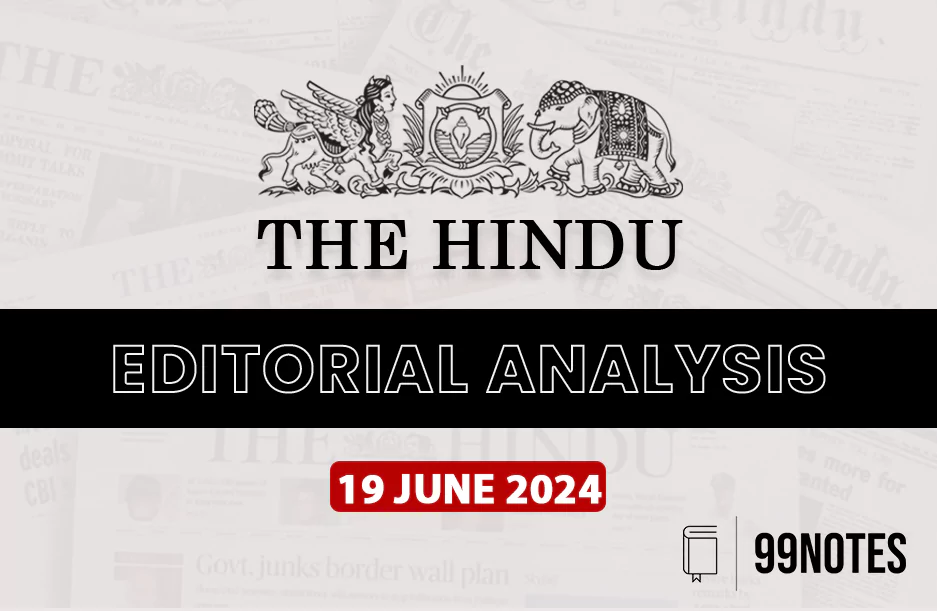19 June 2024 : The Hindu Editorial Analysis
1. The high cost of a global economic decoupling
(Source – The Hindu, International Edition – Page No. – 8)
| Topic: GS2 – International Relations |
| Context:- |
|
Introduction:
- United States President Joe Biden announced new tariffs on Chinese imports in May, sparking concerns about increased economic decoupling globally.
- European policymakers are considering forming a united front against China’s coercive economic practices, reflecting a potential shift in global economic dynamics.
U.S.-China Trade Dynamics:
- Tariff Implementation: President Biden’s decision to impose tariffs indicates a departure from economic interdependence to safeguard national security interests rather than mutual economic benefits.
- Sectoral Impact: Tariffs on Chinese electric vehicles (EVs) aimed to support domestic EV manufacturing and address concerns over Chinese industry competitiveness.
- Healthcare Sector: New tariffs on medical devices seek to reduce dependency on Chinese imports, despite their substantial role in U.S. healthcare supply chains.
Global Economic Outlook:
- Long-term Effects: Continued tariff escalation echoes Trump-era policies but risks exacerbating protectionism globally, hampering international trade relations.
- Green Transition: Restrictions on Chinese clean energy products could delay global renewable energy goals and impact Western multinational earnings amid China’s economic slowdown.
- Resource-rich Economies: Countries like Australia and Brazil face export declines and price pressures on commodities due to China’s economic slowdown and shifting trade dynamics.
European Union’s Strategy:
- Critical Minerals: EU’s efforts to secure critical raw minerals could intensify competition with China, potentially impacting global supply chains and trade dynamics.
- Strategic Alliances: Risks of China-led mineral value chain dominance may influence global green trade policies, challenging Western economic interests.
Southeast Asia’s Position:
- Production Shifts: Southeast Asia benefits from production shifts away from China but remains dependent on Chinese technology and investment.
- Trade Challenges: Potential U.S. rules on origin could disrupt regional supply chains, affecting economies relying on components sourced from China.
Impact on India:
- Market Opportunities: India anticipates gains from global economic decoupling but faces challenges in competing with regional manufacturing rivals and managing economic ties with China.
- Manufacturing Landscape: Despite government initiatives, India’s manufacturing sector lags behind, complicating its role in global supply chains amid geopolitical shifts.
Potential Global Crisis:
- Escalation Risks: Ongoing tariff escalation threatens global economic stability and investor confidence, highlighting the psychological impacts of economic decoupling.
- WTO Implications: U.S. distancing from WTO norms by blocking judicial appointments undermines global trade governance, risking the integrity of international trade agreements.
Conclusion:
- Geopolitical tensions between the U.S. and China, coupled with increasing economic fragmentation, pose significant risks to the liberal international economic order.
- The future trajectory remains uncertain, with potential repercussions for global economic growth and stability if the cycle of escalation persists.
| PYQ: What are the key areas of reform if the WTO has to survive in the present context of ‘Trade War’, especially keeping in mind the interest of India? (250 words/15m) (UPSC CSE (M) GS-2 2018) |
| Practice Question: How do these tariffs changes reflect evolving global economic strategies and what are their potential impacts on international trade dynamics? Analyse with relevant examples and perspectives. (250 Words /15 marks) |
2. Time for a Census, come what may
(Source – The Hindu, International Edition – Page No. – 9)
| Topic: GS2 – Governance |
| Context:- |
| The article discusses the delayed 2021 Census in India, suggesting political motivations behind postponement linked to electoral strategies like advancing delimitation before the 2029 Lok Sabha elections, potentially impacting regional representation and welfare allocations. |
Introduction
- The postponement of the 2021 Census has raised concerns, suggesting a strategic move by the present government to expedite the delimitation exercise ahead of the 2029 Lok Sabha elections.
Reasons behind Delay
- Constitutional Implications: The 84th amendment mandates delimitation based on the first census after 2026, compelling the BJP to delay the census until after 2026 to advance delimitation before 2029.
- Electoral Strategy: BJP aims to leverage delimitation to reallocate Lok Sabha seats, potentially benefiting from demographic shifts favouring northern states over southern states.
- Opposition’s Position: Opposition views delaying the census as detrimental, depriving citizens of accurate welfare allocations and entitlements based on updated population data.
Impact on Electoral Dynamics
- Northern vs Southern States: Delimitation is expected to increase northern states’ representation in Lok Sabha at the expense of southern states, which could provoke regional discontent and political resistance.
- Electoral Calculations: Analysis suggests BJP’s potential gain of approximately 15 seats under a redistributed scenario, highlighting its electoral stakes in delimitation.
- Women’s Reservation: Delayed census postpones delimitation, impacting implementation of women’s reservation under the 106th amendment, affecting political representation.
Legal and Political Considerations
- Constitutional Amendments: Conflict arises between the 84th and 106th amendments regarding the timing of delimitation and implementation of women’s reservation, prompting legal interpretations and political manoeuvring.
- Supreme Court Intervention: Potential legal challenge on delaying census as an abuse of executive privilege and violation of fundamental rights, emphasising the necessity of timely census for governance and democratic processes.
Future Implications and Strategic Choices
- Electoral Outcomes: BJP’s electoral strategy hinges on delimitation’s potential benefits in northern states versus possible backlash in southern states, influencing political calculations and regional dynamics.
- Welfare Impact: Postponement adversely affects welfare schemes’ implementation and entitlements, underscoring the broader societal costs of delaying the census.
- Path Forward: Opposition advocates for timely census to uphold democratic norms and ensure accurate demographic data for equitable governance and welfare distribution.
Conclusion
- The debate over delaying the census underscores broader implications for electoral fairness, constitutional principles, and socio-political stability, necessitating a balanced approach to uphold democratic integrity and governance efficacy.
| Census in India |
|
|
PYQ: Consider the following statements: (2009) Between Census 1951 and Census 2001, the density of the population of India has increased more than three times.Between Census 1951 and Census 2001, the annual growth rate (exponential) of the population of India has doubled. Which of the statements given above is/are correct? (a) 1 only Ans: (d) |
| Practice Question: Discuss the significance of the delayed 2021 Census in India and its potential implications on electoral processes and welfare policies. How does the postponement of the Census relate to the delimitation exercise and the implementation of constitutional provisions. (150 Words /10 marks) |



